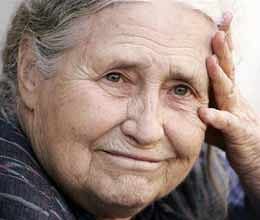
Doris Lessing, the Nobel prize-winning, free-thinking, world-traveling and often-polarising author of The Golden Notebook and dozens of other novels that reflected her own improbable journey across the former British empire, died on Sunday.
She was 94. Her publisher, HarperCollins, said RIP Doris Lessing; Twitter reacts to her death the author of more than 55 works of fiction, opera, nonfiction and poetry, died peacefully. Her family requested privacy, and the exact cause of death was not immediately clear.
Lessing explored topics ranging from colonial Africa to dystopian Britain, from the mystery of being female to the unknown worlds of science fiction.
She won the Nobel Literature prize in 2007. The Swedish Academy praised Lessing for her "skepticism, fire and visionary power." When informed about winning the prize outside her London home she responded: "Oh Christ! ... I couldn't care less."
That was typical of the irascible, independent Lessing, who never saved her fire for the page. The targets of her vocal ire in recent years included former President George W Bush, "a world calamity", and modern women, "smug, self-righteous."
She also raised hackles by deeming the 9/11 terrorist attacks on the United States "not that terrible."
She remains best known for The Golden Notebook, in which heroine Anna Wulf uses four notebooks to bring together the separate parts of her disintegrating life. The novel covers a range of previously unmentionable female conditions, menstruation, orgasms and frigidity, and made Lessing an icon for women's liberation. But it became so widely talked about and dissected that she later referred to it as a "failure" and "an albatross."
Published in Britain in 1962, the book did not make it to France or Germany for 14 years because it was considered too inflammatory. When it was republished in China in 1993, 80,000 copies sold out in two days.
"It took realism apart from the inside," said Lorna Sage, an academic who knew Lessing since the 1970s. "Lessing threw over the conventions she grew up in to stage a kind of breakdown, to celebrate disintegration as the representative experience of a generation, when what you should have been doing is getting the act together."
For some readers and critics, however, the book was an unwelcome exposure of female failings.
The criticism of Lessing's work continued throughout her life. Although she continued to publish at least every other year, she received little attention for her later works and was often criticised as didactic and impenetrable.
She was 94. Her publisher, HarperCollins, said RIP Doris Lessing; Twitter reacts to her death the author of more than 55 works of fiction, opera, nonfiction and poetry, died peacefully. Her family requested privacy, and the exact cause of death was not immediately clear.
Lessing explored topics ranging from colonial Africa to dystopian Britain, from the mystery of being female to the unknown worlds of science fiction.
She won the Nobel Literature prize in 2007. The Swedish Academy praised Lessing for her "skepticism, fire and visionary power." When informed about winning the prize outside her London home she responded: "Oh Christ! ... I couldn't care less."
That was typical of the irascible, independent Lessing, who never saved her fire for the page. The targets of her vocal ire in recent years included former President George W Bush, "a world calamity", and modern women, "smug, self-righteous."
She also raised hackles by deeming the 9/11 terrorist attacks on the United States "not that terrible."
She remains best known for The Golden Notebook, in which heroine Anna Wulf uses four notebooks to bring together the separate parts of her disintegrating life. The novel covers a range of previously unmentionable female conditions, menstruation, orgasms and frigidity, and made Lessing an icon for women's liberation. But it became so widely talked about and dissected that she later referred to it as a "failure" and "an albatross."
Published in Britain in 1962, the book did not make it to France or Germany for 14 years because it was considered too inflammatory. When it was republished in China in 1993, 80,000 copies sold out in two days.
"It took realism apart from the inside," said Lorna Sage, an academic who knew Lessing since the 1970s. "Lessing threw over the conventions she grew up in to stage a kind of breakdown, to celebrate disintegration as the representative experience of a generation, when what you should have been doing is getting the act together."
For some readers and critics, however, the book was an unwelcome exposure of female failings.
The criticism of Lessing's work continued throughout her life. Although she continued to publish at least every other year, she received little attention for her later works and was often criticised as didactic and impenetrable.








